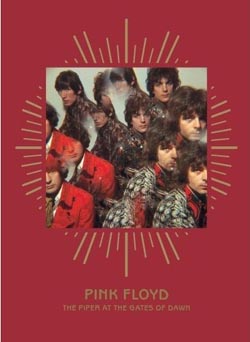Forty years after its release, and a little over a year after the death of
Syd Barrett, a primary architect, Pink Floyd’s 1967 debut The
Piper At The Gates Of Dawn has been reborn. Two and three CD sets from
EMI have been unleashed — the former features fully remastered mono and
stereo versions of the album, while the latter resembles a cloth-covered book
with the original Vic Singh photo cover designed by longtime Floyd collaborator
Storm Thorgerson. In addition to the remastered mono and stereo mixes, the three
CD comes with an eight-page reproduction of one of Barrett’s notebooks, while
the third CD includes bonus tracks — singles “Arnold Layne,”
“See Emily Play,” and “Apples And Oranges”, along with B-sides
“Candy And A Current Bun” and “Paintbox,” and assorted odd
balls like an exclusive edit of “Interstellar Overdrive,” previously
available only on an EP released in France, and the 1967 stereo version of “Apples
And Orange,” which has never before been officially released. No bad.
Titled after the seventh chapter of Kenneth Grahame’s children’s book,
The Wind In The Willows, The Piper At The Gates Of Dawn
is a significant psychedelic signpost and arguably the pinnacle of Syd Barrett’s
genius. The Madcap mixed child-like lyrics with a cacophony of strange and wondrous
sounds, creating impish and crafty little vignettes that spewed on about everything
from neighborhood perverts to winter solstice and the outer limits of conventional
thought. Was it the acid, the schizophrenia, or the work of an overactive imagination?
Probably all three to a certain degree.
Inspiration was certainly in the air as the members of Pink Floyd began recording
the album at Abbey Road in the spring of 1967 — at the same studio and
time the Beatles were cutting Sgt. Pepper’s Lonely Heart Clubs
Band. As, Piper was also being produced by the Beatles’
former engineer, Norman Smith, it is reasonable to assume that some of that
Fab magic rubbed off. But only as far as you can detect even the slightest resemblance
between “A Day In The Life” and “Interstellar Overdrive.”
Truth be told, Piper and Pepper couldn’t
be more different from one another. “Astronomy Domine” opens the
album on a spaced-out, sedated electronically charged tale about roaming the
planets with nasty, web-feet staccatos and jagged whiplash lines sung by Barrett
and keyboardist Rick Wright like, “Flicker, flicker, flicker, blam, pow,
pow…” It remained a popular song in the Floyd’s concert set
for years, and was even resurrected in 1994 during the latter-day Floyd’s Division
Bell tour.
“Lucifer Sam” has a hip rhythm and shimmy shakin’ sense for
the day, while “Matilda Mother” is a fairy tale with a very British,
Kinks-like delivery. “Flaming” takes Barrett’s penchant for
lyrical wordplay to a surreal level before the damn breaks and “Pow R.
Toc H.,” a nocturnal instrumental, spills out over into air waves like
a prison riot on crack. This is really what set Floyd apart from their contemporaries,
if they ever had contemporaries. “Roger Waters marks his first Floyd composition
with “Take Up Thy Stethoscope and Walk,” a saucy little number with
some wild guitar work from Barrett and absolutely no lyrics utilizing the equally
impressive title.
“Interstellar Overdrive” would help perpetuate the group to the
frontlines of London’s psychedelic gravy train. The lucid instrumental
is like an improvisational roller coaster, that would often grow and infest
and stain the listening audience for 20 or 30 minutes. It became the centerpiece
for Peter Whitehead’s psychedelic documentary Tonite Let’s All Make
Love In London, forever ingrained in the perforated blotter paper that
ate its way into the brain cells of every hipster in Piccadilly.
Then, Barrett returns to the banter of “See Emily Play” and “Arnold
Layne,” spinning yarns about gnomes (“The Gnome”), scarecrows
(“Scarecrow”) and bicycles (“Bike”). Today, people marvel
at the brilliance of the one-time leader and visionary of Pink Floyd and the
only album he truly owned. But back in 1967, it barely snuck inside the U.K.’s
Top Ten and landed in America with a big thud, climbing as high #131. Thus began
the long road ahead for the group’s ascension. But 40 years later, The
Piper At The Gates Of Dawn is still unadulterated joy without pretension,
without restraint, and a solemn reminder of the short and rapturous luster of
the late, great Syd Barrett.
~ Shawn Perry




















